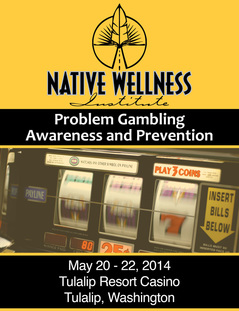Social gambling is very much like social drinking. Most people can do it occasionally without any problem. But compulsive gambling is a progressive illness, much like alcohol or drug addiction. It may start as social gambling but at some point, it progresses to compulsive gambling, resulting in poor health, ruined relationships, financial trouble, and other problems. Gambling and casinos are everywhere now in tribal communities, leading to an increase in problem gambling among Native people. Gambling addiction extends beyond the gambler. Family members and friends can be severely impacted by the problem gambler's behaviors and activities. Often, only loved ones of the problem gambler will ever know about the problem because it affects the most personal aspects of their lives: relationships, home life, professional life, and finances. Because the effects of problem gambling are not as outwardly visible as drug or alcohol use, problem gamblers may be able to hide their behaviors for a long time. Here are some things to look for to determine if someone in your life is a compulsive gambler:
Do any of these behaviors sound familiar? Perhaps you have experienced some of these in your own life with someone who gambles. The compulsive gambler, like most addicts, has a very difficult time admitting there is a problem. Gamblers claim they can stop at any time. There may be periods that they do stop; however, for the compulsive gambler, this is nearly always temporary. Compulsive gamblers frequently do not want to discuss counseling, therapy, or self-help programs. To do so means admitting there is a problem and that change needs to occur. Sometimes, family members and loved ones contribute to this behavior. Because they feel powerless to confront the gambler, they remain silent. The fear of the unknown can be paralyzing for many people, and they stay in painful familiar situations rather than make changes. Family members and friends are severely impacted by the compulsive gambler's behaviors and activities. They feel worn out and feel they have tried everything. They feel their situation is hopeless and that nothing will work. In fact, it is true that others cannot change the problem gambler. Change must come from a desire within the problem gambler if it is to last. However, there is a world of hope for you and other loved ones. No matter how difficult things may seem, change is possible. Those closest to the problem gambler must first rescue themselves. They can then be there to lend a hand to the problem gambler when and if the time and opportunity arrives. SOME SUGGESTIONS (SELECTED AND ADAPTED FROM GAM-ANON) http://www.gam-anon.org/index.php/about-gam-anon/suggestions
For help, call 1-800-522-4700 for a 24-hour free confidential hotline and/or visit the National Council on Problem Gambling www.ncpgambling.org to find resources in your city or state. Some of the information above was adapted from the Florida Council on Problem Gambling: http://gamblinghelp.org Consider attending the Native Wellness Institute’s Problem Gambling Awareness and Prevention Training on May 20-22 in Tulalip, Washington. The training is the first of its kind. Click on the image link below to find out more and register.
2 Comments
|
About This BlogThe Native Wellness Institute knows that wellness takes hold every day all over Indian Country. We invite you to tell us what is happening in your family, organization, tribe, or community. Send us a short article (1-3 paragraphs) with your activities, experiences or thoughts. Please include photos or videos and a little bit of information about you. We may edit some of the content if needed and then share it with our readers! Please send your blog submission to [email protected]. Archives
May 2015
Categories |
© Copyright 2008 - 2024 Native Wellness Institute All Rights Reserved


 RSS Feed
RSS Feed